The Kammersee Affair Read online
Page 38
It was five thirty. Hartman wasn’t due for another thirty minutes. I’ll be ready for him. He walked out of the hotel, and crossed the road. Then he turned to the left, toward the house. He stopped at the corner, and peered into the street. From there he could see the house clearly. It was twenty minutes to six. Another twenty minutes yet.
There was no let up in the rain. He was beginning to feel cold, and his leg was beginning to hurt. It was probably the dampness. He slowly walked back toward a sheltered tram stop, a short distance away. As he waited at the stop, a tram clanked around the corner, coming to a halt a few yards in front of him. A number of people got off of the tram, and several brushed past him. He checked to see if Hartman had been amongst them. He wasn’t.
Scott stepped back to get out of the way. As he did so, he saw a cab drive by, and pull into the kerb, a short distance away. A man wearing a dark grey suit got out, paid the driver, and started to walk toward the newspaper kiosk, on the opposite side of the road. Instinctively, Scott knew that, there, approximately fifty yards ahead of him, walking along the footpath, was Hartman. He started to follow him. The man in grey had stopped at the roadside, waiting for the traffic to clear. Scott ducked into a doorway. The man was preparing to cross the road. He carefully looked both ways checking the traffic. As he looked to the right it seemed that he was looking directly at Scott.
It certainly looked like Hartman. But Scott had to be absolutely sure. Scott slowly came out from the shadow of the doorway. He called out Hartman’s name, and immediately ducked back into the doorway. Hartman, startled, looked around to see who had called out. At that moment Scott was absolutely certain. It was Hartman.
Hartman looked agitated. Who had called him? Who knew his real name? He was anxiously looking all around. Scott kept into the shadows. A short while later Scott re-emerged. Hartman had disappeared. Scott stepped out into the light, and anxiously looked in all directions. Then he saw him on the other side of the street, just turning into a side street. Scott stood at the kerbside, his progress stopped by the flow of traffic passing by. At last, there was a break in the traffic. Scott stepped into the road, and ran across the road. The jolting on his leg was painful. He reached the other side of the street. He hurried to the corner of the side street where Hartman had gone.
Scott looked down the street. There was no sign of Hartman. Where could he be? He had turned into this street, Scott was certain of that. Either he has stopped off somewhere along the way, or he had got all the way through a lot quicker than he had imagined. Either way the street had to be checked. Scott started to make his way along. He had gone about two thirds of the way along when he noticed Hartman coming out of a doorway up ahead. Scott stopped, and turned around hoping that Hartman had not seen him.
A few moments later he turned back. He could see Hartman hurrying along a hundred yards ahead. Scott quickened his pace. Gradually he began to catch up with Hartman, when he suddenly turned into another street. A few moments later Scott reached the junction. He cautiously looked down the road. It was virtually deserted. Hartman was approximately thirty yards away when he suddenly stopped, and looked around. Did he know that he was being followed? A moment later he started forward once again. This was the moment that Scott had been waiting for. He called out Hartman’s name a second time, and then quickly moved back around the corner. Hartman stopped once again, and turned around to face the direction the call had come from. Seeing no one he turned back.
Suddenly the moment was right. Hartman was looking in the wrong direction, and there was no one else nearby. Scott took out his revolver, stepped out from the corner. He raised the gun and took careful aim. Then he called Hartman’s name once again. He then fired two shots in quick succession. At that precise moment Hartman saw Scott, and realisation hit him a fraction ahead of the bullets.
The first bullet hit Hartman in the right side, high up, and went through his right lung, shattering two ribs on its way through Hartman’s body. The force spun Hartman around to the left, and he staggered backwards. The second shot hit him in the back of the neck, exiting through his throat, as he fell forward, and down. He slumped to the ground. He was dead before he hit the pavement. Scott walked toward Hartman, and looked at him lying on the ground. Quietly he said to himself, “It is done, Terry, it’s all over now.”
Quickly a crowd began to gather, attracted by the gunshots. One or two women were screaming.
“Somebody get an ambulance,” someone yelled.
“Get the police quick!” said another.
A number of people turned to face Scott. He was still standing motionless, hovering over Hartman’s body, the gun still in his hand. The rainfall was getting heavier now, and it was running down his face, on to his collar, and trickling down his neck. His clothes were soaked.
“He did it,” someone was saying.
“Careful, don’t go near him,” cried another. “He has a gun.”
The noise grew and grew. Gradually building and building, until it became a crescendo. The noise stirred Scott into action. Suddenly he became aware of the situation he was in. He hurriedly turned away from the crowd, and began running back toward the corner.
Across the road, Scott could see a group of young boys walking past. The leader of the group raised his hand and waved at him. It was only a very brief wave, and Scott ignored it completely, but it had not gone unnoticed by somebody in the crowd.
* * *
Scott ran and ran. He ran as fast as he could. As fast as his injured leg would allow. He had no idea of where he was going. He just knew that he had to get away, and quickly. He could hear the noise of the crowd behind him. In the distance he could already hear the police sirens blaring. It was raining heavy than ever, hampering his movements, and slowing him down. His leg was paining quite badly. They would catch him quite soon.
What he needed was a car, right now. Then he noticed the traffic lights at the corner ahead. As he reached the junction, the lights suddenly turned to red, and a car stopped by the side of him. Scott looked all around. Apart from this one car, the road appeared to be completely deserted. There was no other traffic behind. In the other direction there was a car in the distance, but still a long way off. There was no one on the footpaths. It was a risk, he knew that, but he had no choice.
He went over to the car, and casually asked the driver for directions. As the driver spoke, Scott took out his gun and thrust it through the window, and ordered the driver to get out of the car. As he did so, Scott pushed him violently to the ground, and then got into the car. He put the car into gear, let out the brake, and put his foot hard down on the accelerator. Ignoring the red light, the car roared across the junction, narrowly avoiding a solitary car which suddenly appeared from nowhere. The car swerved violently.
Almost instantly there was a police motorcyclist following him. That was stupid, he thought to himself. That cop is after me for a stupid motoring offence. Scott decided to find somewhere suitable, and to allow the motorcyclist to catch him. He would then deal with him, as necessary. He continued to drive, until he saw a quiet cul-de-sac. It was dark, and there was no one in sight. He came to a stop, and waited for the policemen. As the motorcyclist arrived, Scott got out of the car, and walked toward the policeman.
“Officer, I’m so sorry, I don’t know what I was thinking of,” Scott was saying. “Complete lapse of concentration or something, quite stupid of me, really.”
The police officer walked over to him. “Could I see your driving license, please, sir.” Scott reached into his inside pocket, and pulled out his old army identification card. He handed it to the officer. Because of the darkness the police officer had difficult in seeing the document. Scott had deliberated stopped where there were no street lights. The police officer took a torch out of his pocket and turned it on, shining the light on to the paper. Both hands were now occupied. This was the opportunity that Scott had been waiting for. He quickly took a knife out from his coat pocket, and quietly walked to the back of
the officer.
The policeman was just in the middle of saying that the document was invalid, when Scott reached forward, and cut his throat. The officer slumped down. Scott took hold of the back of his collar, and dragged the body into the undergrowth at the edge of the road. He then went back for the motorcycle, when a light suddenly came on in one of the houses opposite. The light spread into the road close by.
“Who’s there?” a voice called out from the house. “What are you doing?”
Scott dropped the motorcycle, got back into the car, and slowly drove away. Had he been seen? He could not be sure. It was very dark. No, he couldn’t have been seen. Even if had, he certainly couldn’t have been identified could he?
* * *
At about that same time the police had arrived at the murder scene. Within a few minutes the area had been completely sealed off, and the official inquiry was underway. The body was examined, photographed from every angle, and eventually taken away. A meticulous search for evidence was now being carried out. Preliminary questioning of the potential witnesses was also underway. It seemed that despite the large crowd that had gathered, no one had witnessed the actual shooting.
Certainly they had seen the body lying on the ground, and certainly they had seen the man standing over the body, the gun still in his hand. Descriptions of this mystery man varied wildly. He was slim, with dark brown hair, said one. Very tall, about six feet six, said another. Black hair, about five feet nine, said a third. Whilst a fourth could remember no details at all, except that there was “something about his eyes.”
Descriptions of his clothing were just as diverse. The only firm piece of evidence, that seemed to be consistent, was the fact that he seemed to have a limp, and he had ran off in the direction of the main road.
“Okay,” said the police officer in charge. “If there’s nothing else, you can all go. Just leave your names and addresses with my Sergeant, over there.”
With that the crowd began to disperse. One man was hesitant. Eventually he approached the officer. The policeman saw him approaching. “Yes sir,” he said. “Is there anything I can do for you?”
“I’m not really sure, officer,” he said. “It’s probably not important.” He stopped, unsure of what to say. “Sorry, no, it’s nothing. Not really. Just forget it.” He started to walk away.
“Just a moment, sir,” said the officer, stopping him. “If you have any information, anything at all, no matter how small it is, or insignificant it seems, or how un-important you might consider it, I’d still like to hear it.”
The man turned, and looked at the police officer. “As I said, it’s probably nothing, but across the road, just over there, was a group of young boys.” He hesitated, pointing across the street to where he had seen the children. “I don’t know. It just seems so vague now I think of it. I don’t want to waste your time.”
“Please carry on, sir,” the officer gently prompted. “Let me be the judge of that.”
“All right,” said the man. “They were just walking along, over there. The boys seemed to know the person with the gun. The boy leading the group, looked over in this direction, and saw the man, and seemed to wave to him. It seemed that way to me, anyway.”
“Did the man wave back?” asked the officer.
The man wasn’t sure. “I don’t think so,” he replied. “At least I can’t say that I noticed, sorry. Was it important?”
“That’s all right. Thank you for your assistance, sir,” said the officer. “That could prove most useful. Incidentally, do you know the children, or where they might be right now?”
“No I’m afraid I don’t officer,” the man replied. “But it looked like they were heading toward the park.”
The Officer thanked the man for his assistance. “You have been most helpful,” he said. “Leave your details with my Sergeant over there.” He then turned to one of the Officers close by. “Get over to the Park, Rudi. Take Heinrich with you. There should be a group of children there somewhere. Bring them back here,” he instructed. “And no arguments, understood?”
“Understood, Inspector,” Rudi said.
* * *
Ten minutes later the two policemen returned. “Here they are,” said Rudi, leading the six young boys over to the Inspector. Heinrich brought up the rear, with a mongrel tugging on a makeshift lead.
“What do you want with us?” one of the boys demanded to know. “We ain’t done nothing have we gang?” The boy looked around at the others, to be greeted by a huge cheer.
“All right, all right,” said the Inspector. “That will do.” The cheer stopped. The Inspector turned toward the boy who had spoken. Obviously the leader of the gang he thought. “Okay now, what’s your name?” The boy remained silent. The Inspector asked again.
“What do you want with us?” the boy repeated.
The cheer started once again, only to stop instantly as the Inspector looked around at the other boys, and glared threateningly. He looked back at the gang leader. “We think that you could be of some help to us.”
“Go on,” the boy said. “I’m listening.”
“You were seen walking on the footpath, over the other side of the road,” the Inspector said, indicating the area. “About twenty minutes ago.”
“What about it?” the boy responded. “Nothing wrong with that is there?”
“Certainly not,” the Inspector quickly remarked. “Nothing wrong at all, but you were seen waving to someone. We would like to know about that person.”
The boy turned around looking at the rest of the gang. He stared hard, and there was a slight, imperceptible shake of the head. He mouthed the words “Keep quiet.” He then turned back to face the police officer. “Don’t know what you’re talking about,” he said. “Didn’t wave to any one, did we?”
From behind him came a loud, and emphatic, “Nooooooo.”
As he replied the Inspector noticed the look on the face of one of the other, younger, boys, standing nervously at the back. The Inspector looked back at the gang leader. “All right, so you can’t help me. That’s a pity. Never mind it can’t be helped. You can go.” The leader looked relieved. “But perhaps, your friend back here, he may know something.” The gang leader was horrified. He spun round to face the other boy, shaking his head violently. “Don’t say anything!” he yelled.
“Rudi, take this young man back to the park, please,” the Inspector ordered. The gang leader started to walk away, the others starting to follow. “Not the rest of you,” the Inspector said. “You stay where you are.” The gang leader stopped. What was happening, he wondered. “Take him away, Rudi,” the Inspector repeated.
The Inspector turned his attention onto the young boy. “What’s your name, son,” he asked.
“Johan,” the boy replied, nervously. He started to shuffle from one foot to the other.
“It’s all right, Johan,” said the Inspector. “There’s nothing to worry about. You’re not in any trouble. I just need your help.” The boy stopped shuffling, but continued to look down at the ground. “Is that your dog?” the Inspector asked.
The boy looked up surprised. “Oh no, he’s just a stray, but we look after him,” he said. “He follows us everywhere we go.”
“That’s nice,” said the police officer. “I bet he’s very fond of you. All of you, I mean.” The officer watched the boy closely. “Now Johan, what can you tell me about the man you waved to. Did you know him?”
The young boy became nervous once again. He looked down at the ground, and began tapping his hands together. He was unsure of what to do, or say. The leader said that he wasn’t to say anything. He had to keep quiet.
“Come on now,” the police officer gently tried to persuade him. “You can help us a great deal. You know that man needs a lot of help, but unless we know something about him, what can we do?”
“I don’t know his name or anything,” the boy eventually responded, his voice barely audible. “But we met him at the hotel around the corner.”<
br />
“Do you mean the Bremner?” the officer asked quickly. The boy nodded.
“Thank you. Thank you very much,” the officer said. “You can go back to your friends now. You have been a great help.” The boy quickly ran back to the others, and they all hurried back into the park.
Chapter Twenty-Nine
A Hunted Man
Twenty minutes later the Police had obtained full details taken from the registration documents of the Hotel. They had his name, together with a detailed description. Shortly afterwards the Inspector received a routine report of a car being stolen. The report contained a description of the man wanted. It generally agreed with the description of the man that he was looking for. That man was heading south.
The body of the motor cycle policeman was discovered a little over an hour later. Police questioned the neighbours. One man had thought that he had seen something, but it was so dark. “But I’m sure I saw a car turning to the left, over there” he said pointing to the end of the roadway. “It then sped away toward the north-east.”
“The north-east,” said the Inspector. “He’s changed direction.”
“Looks that way, sir,” said the Sergeant.
“I want every available officer looking for this man. He must be caught,” the Inspector announced. “I want road blocks set up at all major roads out of the city. I want all railway stations, bus depots, and the airport checked, and sealed tight.”
“Yes sir, right away,” said the Sergeant. He started to walk away, when he suddenly stopped, and turned back.
“Sir he’s heading for Kiel,” he said. “He could be heading for the docks. Perhaps he intends boarding a ship.”
The Inspector examined the map laid before him. “Could be,” he said. “Better get on to the harbour authorities, and warn them. Issue his description, and tell them to keep a look out.”

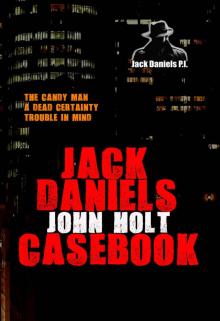 Jack Daniels - Casebook
Jack Daniels - Casebook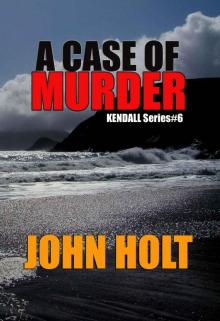 A Case Of Murder (Kendall Book 6)
A Case Of Murder (Kendall Book 6)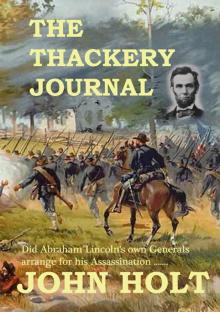 The Thackery Journal
The Thackery Journal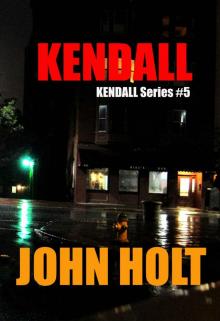 Kendall (Kendall Book 5)
Kendall (Kendall Book 5) Kendall - Private Detective - Box Set
Kendall - Private Detective - Box Set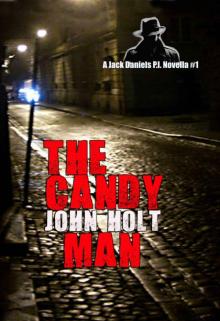 The Candy Man: A Jack Daniels P.I. Novella #1
The Candy Man: A Jack Daniels P.I. Novella #1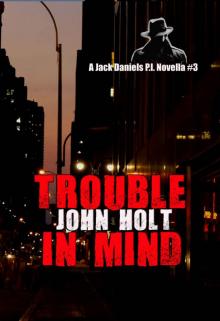 Trouble In Mind: Jack Daniels P.I. Novella #3
Trouble In Mind: Jack Daniels P.I. Novella #3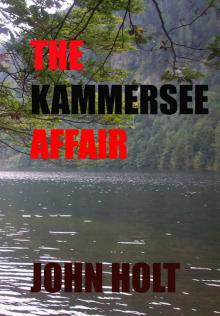 The Kammersee Affair
The Kammersee Affair